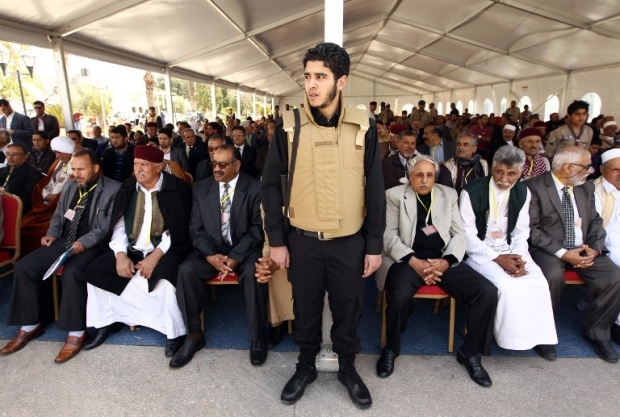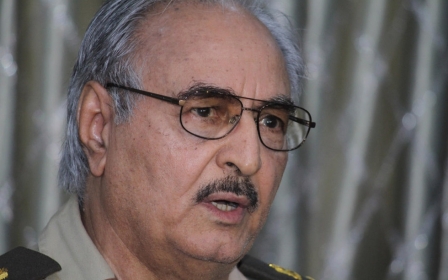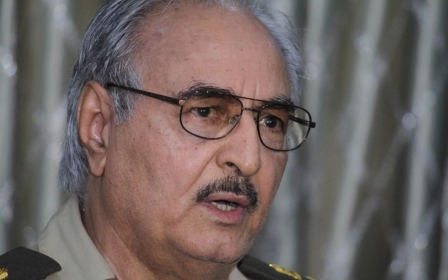Libya's parliament approves new prime ministerial appointment

The interim parliament in Libya voted on Sunday to approve the prime ministerial appointment of Ahmed Miitig, sparking fears of increased division after rogue general Khalifa Haftar led an attack on Benghazi last week to “purge” the country of terrorists.
“As many as 83 out of 93 lawmakers who attended Sunday’s session voted in the new cabinet’s favour,” Omar Boushah MP told the Turkish Anadolu Agency.
Eight of the 23 ministerial posts have been left vacant, a move believed to be an attempt to allow for Ahmed Miitig to engage in discussions with political groups to build a cabinet of national unity. Miitig, a businessman from Misrata who says he is an independent candidate, will likely become Libya’s fifth and youngest prime minister since the overthrow of former leader Muammer Gaddafi in 2011.
The vote in the parliament, also known as the General National Congress, went ahead despite threats from militias allied with ex-Libyan army general Haftar to attack and arrest parliamentarians should they convene the meeting. The government has branded Haftar an outlaw and accused him of attempting a coup, after his forces launched an assault in Benghazi on 16 May that killed at least 79 people.
Speaking before the vote on Sunday, UN secretary-general Ban Ki-Moon urged calm and said he was “deeply concerned by recent developments in Libya, in particular the growing military mobilization in and around Tripoli”.
“Armed confrontation risks negating the sacrifices made by the Libyan people during their struggle for freedom and human dignity,” Ban said on Saturday, calling on “all parties and leaders of military formations to abide by moral and legal obligations to safeguard and protect civilians”.
After the vote on Sunday the outgoing Culture Minister Habib Amin, who last week announced his support for Haftar’s “Operation Dignity”, warned the confirmation of Miitig’s government could trigger renewed violence.
“Today the GNC is beating the drums of war, they want to drive the country into an armed conflict for power after all peaceful and political means have been exhausted,” Amin told Libya’s al-Ahrar TV. “They are leading the country into a direct confrontation,” he added.
Commentators responded to Sunday’s vote with concern that it may fuel nationwide divisions, after some suggested it could spark further calls for a federal state.
Others have described the parliament as pushing ahead with the democratic process, insisting it is the only option in a country where no one has the power to enforce a military solution.
“A coup does not work in Libya, you cannot use force to impose your political views because everyone has force,” said Mohamed Abdel Malik, foreign policy representative of Libya’s Muslim Brotherhood. “Everyone is pointing the gun, it’s mutually assured destruction,” he added.
“This is where Haftar is unique, he thinks he can get away with war.”
Haftar is, however, attempting to build support for his offensive and on Saturday evening 40 members of the GNC threw their weight behind him. He claims to have a “mandate” from the people to tackle terrorism in Libya, after thousands of people protested in support of him on Friday in Benghazi.
Haftar has military backing from an elite special forces unit in Benghazi, officers at the Tobruk air base, the powerful al-Baraassa tribe in the east and support from ex-rebel brigades from Zintan and the chief of staff of Libya’s air defence units.
Conversely fighters from Misrata’s 235 militia brigades have deployed near to the capital Tripoli demonstrating their backing for the government, which has also received support from protesters who do not wish to see Haftar take control of the country.
All of this pushes Libya closer to an armed conflict, MEE’s consultant Ramzy Baroud said in a column this week. “If this showdown is allowed to carry on, a bloody civil war will be awaiting Libya, one that might prove even bloodier and lengthier than the NATO-led war against Gaddafi,” writes Baroud.
“This time around, however, neither NATO nor the US seem willing to get involved again, at least not until one warring camp proves worthy of their support.”
The confirmation of Miitig’s cabinet will now rest on former Prime Minister Abdullah al-Thani confirming his resignation and accepting the new appointment. If this happens, the new cabinet will only have a short period in office should 25 June legislative elections take place as planned.
New MEE newsletter: Jerusalem Dispatch
Sign up to get the latest insights and analysis on Israel-Palestine, alongside Turkey Unpacked and other MEE newsletters
Middle East Eye delivers independent and unrivalled coverage and analysis of the Middle East, North Africa and beyond. To learn more about republishing this content and the associated fees, please fill out this form. More about MEE can be found here.




